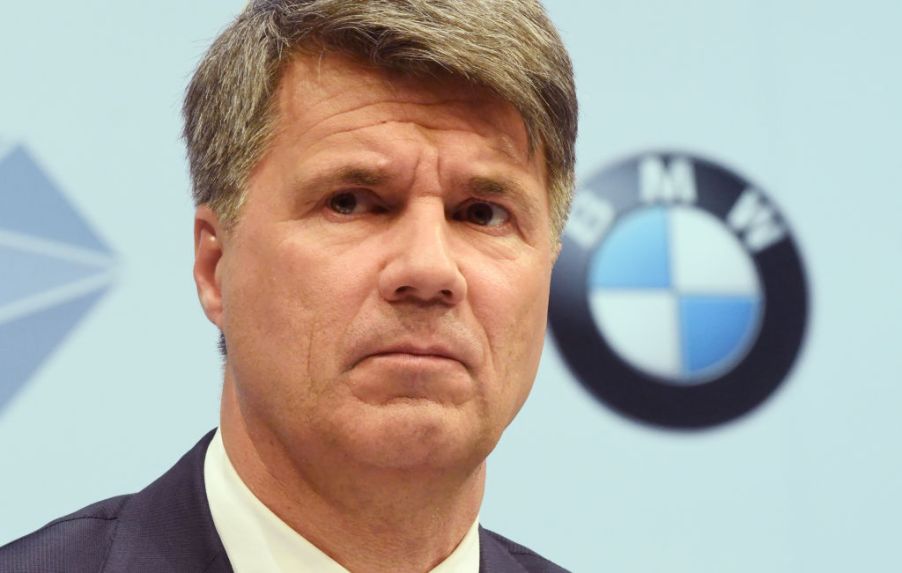
BMW’s CEO Just Quit Because of This Huge Mistake the Company Made
When Harald Krueger was chosen as the new CEO of BMW just four years ago, he seemed like the perfect choice. Young and energetic, yet having decades of experience within the company.
Krueger seemed primed to guide the luxury carmaker into the future — a future that included electric cars. Yet just last week, two weeks before his contract came up for renewal, Krueger quit.
One of the biggest reasons? Many are pointing to the release of the new all-electric Mini Cooper as the final straw for Krueger in BMW’s messy, stressful transition into the future of vehicle production.
Harald Krueger’s history with BMW

The Associated Press reports, “BMW CEO Harald Krueger is stepping down after a four-year tenure in which the automaker lost its lead in luxury car sales and saw an early head start in electric vehicles evaporate.” Prior to his rise to CEO, former CEO Norbert Reithofer, BMW had outsold Mercedes-Benz and Audi for almost a decade.
BMW had also been a pioneer in moving to electric vehicles, with its battery-driven vehicle, the i3, introduced in 2013. This car was years ahead of competitors.
Alas, BMW did not follow up with any worthwhile successors. It had focused much of its electric power on plug-in hybrids, which run on a combination of electric power and internal combustion. Meanwhile, Tesla took much of the sales in premium-priced electric cars.
According to the AP, Krueger “was ‘too cautious,’ said Ferdinand Dudenhoeffer, director of the CAR Center for Automotive Research at the University of Duisburg-Essen. ‘BMW was not able to use the head start for a new generation of electric vehicles.'”
Did the release of the all-electric Mini Cooper impact Harald Krueger’s decision to resign?
The all-electric Mini Cooper will be released in early 2020. It has a hefty price tag of $35,000 and travels 146 miles per charge. As our friends over at The Verge note, when you compare these figures to similarly priced (or less expensive) EVs on the market, the Mini’s mileage looks weak and its cost-prohibitive. Things will only get worse next year as more capable electric cars hit the road, and the Mini gets its official EPA mileage rating.
For a company that was the first to begin serious production of EVs, it’s kind of baffling to see how quickly the company went under in the all-electric market. Many of us are left scratching our heads, wondering why. However, Krueger’s recent resignation may be the answer we’ve been looking for.
For one, soon after Kruger’s takeover, sales for the i3 city car plummeted. BMW had been the first major automaker to use lightweight carbon fiber in its i3 cars. Unfortunately, this plan was soon called into question when the use of carbon fiber turned out to be too expensive for mass-market models.
There was also the diesel crisis that heavily impacted rival Volkswagen. It had the second-hand effect of marring the reputation of German-built cars in the industry, which would include BMW.
Then, as if that were not enough for Krueger to be faced with, the recent U.S.-China trade wars caused BMW to pay costly tariffs on vehicles exported to China from its plant in South Carolina. With so many stressors, it may be difficult to pinpoint one root cause for his decision to step down from leadership.
Were there warning signs early on?
Many speculated that Krueger was under enormous pressure after his first large public appearance at the Frankfurt car show in 2015. Just minutes into his presentation, the then-CEO of BMW collapsed. Krueger later blamed the incident on dehydration and travel fatigue. Looking back, could this have been the first warning sign that he was simply under too much pressure?
With all of these factors in play, it may not be the release of the Mini Cooper that is to solely to blame for Krueger stepping down. It may be, in fact, that the overall stress he and many others are facing in light of the recent boom surrounding EVs and the need for innovation was simply too much to handle.


